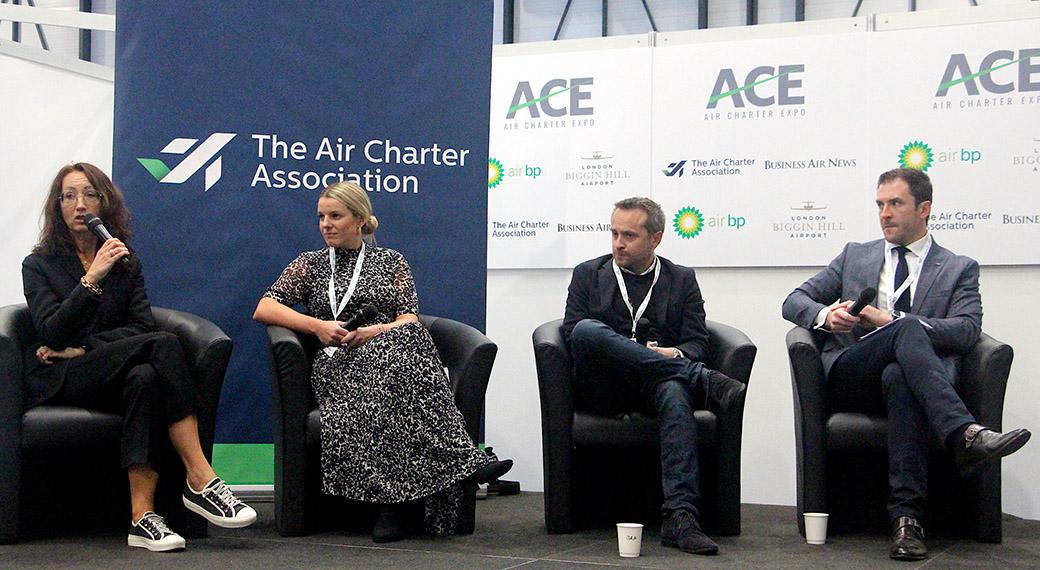
Daniella Flierl of AirGO (left) speaks during a session on passenger charter at the Air Charter Expo. Listening are Air Charter Service's Jessie Howes (second from left), Titan Airways' Alex Harrington and TAG Aviation's Alex Harrington.
BIGGIN HILL, ENGLAND—Success brings myriad challenges, several passenger charter executives tell attendees at the Air Charter Expo conference at Biggin Hill Airport.
Soaring demand for private charters is great news for brokers, operators and owners, but availability has become a critical limitation, one that is often difficult to resolve.
Following a period of apparent market uncertainty in the early part of 2022, with tentative inquiries more numerous than confirmed bookings, the period from the end of March through July saw unprecedented activity, Karl Mills, chief commercial officer of TAG Aviation Europe, tells a conference panel session on Sept. 27. This brought pressures for the operator of over 80 heavy jets for private and corporate owners.
“During COVID, there were a lot of new entrants to the industry who had just purchased their aircraft,” Mills says. “We were lucky. Some of them were delivered just in time, ready for charter revenue for the summer. But what do a lot of first-time buyers want to do as soon as their aircraft has been delivered? They want to use their asset, to play with their new toy. So the availability of those aircraft was sometimes a little bit less than we were hoping for.”
The new customers have entered private aviation at all levels. Some have unrealistic expectations around pricing, though this is a perennial problem, according to Daniella Flierl, founder and CEO of German-based AirGO, Europe’s largest management company for Piaggio Avanti aircraft.
“We always have this type of new customer who’s just chasing the lowest price,” she says. “With the pandemic we also saw new clients who were not used to flying private. They try to find a very cheap solution, but AirGO is not a cheap solution. We might be cheaper with our Avanti with this huge cabin compared to another aircraft of the same cabin size. But it’s a service. It’s quality. It’s safety, and we have to provide that and we will not negotiate down to rock bottom.”
New entrants who turned to private aviation because of health-related concerns amid the COVID-19 pandemic now have been supplemented by traditional customers of scheduled airlines who are finding those services unreliable. While both the pandemic and airlines’ current operational difficulties are temporary, there is optimism that enough of the new customers will stay to keep demand levels high.
“We saw a great increase from the pandemic but now, with the scheduled airlines’ disruption in 2022, we’ve got the biggest base of brand-new and existing clients that we’ve ever seen,” says Jessie Howes, London-based private-jets director of the global provider Air Charter Service. “It might cool, but as long as we as an industry continue to be more reliable than scheduled airlines, I think they will stay.”
At least as important for sector businesses, charter prices have risen since a low in the early days of the pandemic. Without higher prices offering aircraft owners better margins, availability of aircraft to the marketplace will become even more constrained.
“During COVID times, a lot of people who just historically had never considered charters, who were reliant on scheduled services and still needed to get from A to B, were having to look at chartered solutions,” says Alex Harrington, commercial director of Titan Airways, a London Stansted Airport-based operator of passenger and cargo charters on larger aircaft. “That came at a time when prices dropped very, very low, and I think that enticed a lot of people in.
“Where there was a good scheduled service option, we found the majority of those customers did eventually go back to that sort of offering,” he continues. “In the cargo market, we’ve had a few more people decide, ‘No, we want to have something more reliable.’ They’re using a lot of belly space in passenger units, and that’s become completely unreliable.”
Ultimately, the future of the charter sector depends on companies continuing to provide a service which customers believe is worth paying extra for. And for charter providers, this will inevitably mean increasing staffing levels to ensure the increased numbers of customers continue to receive a high-quality service.
Howes says Air Charter Service has undertaken a “massive recruitment surge” as it seeks to manage a 40% increase in flight volumes. Harrington highlights recruitment as a significant challenge, second only to inflation as the most pressing concern he has for Titan in the coming months. At TAG Aviation, finding new staff is the immediate priority now that the summer rush is beginning to cool down.
“We would love to recruit; we need to recruit,” Mills says. “That’s what I’m going to be doing for the next three months. We just didn’t have time on the service side.”




